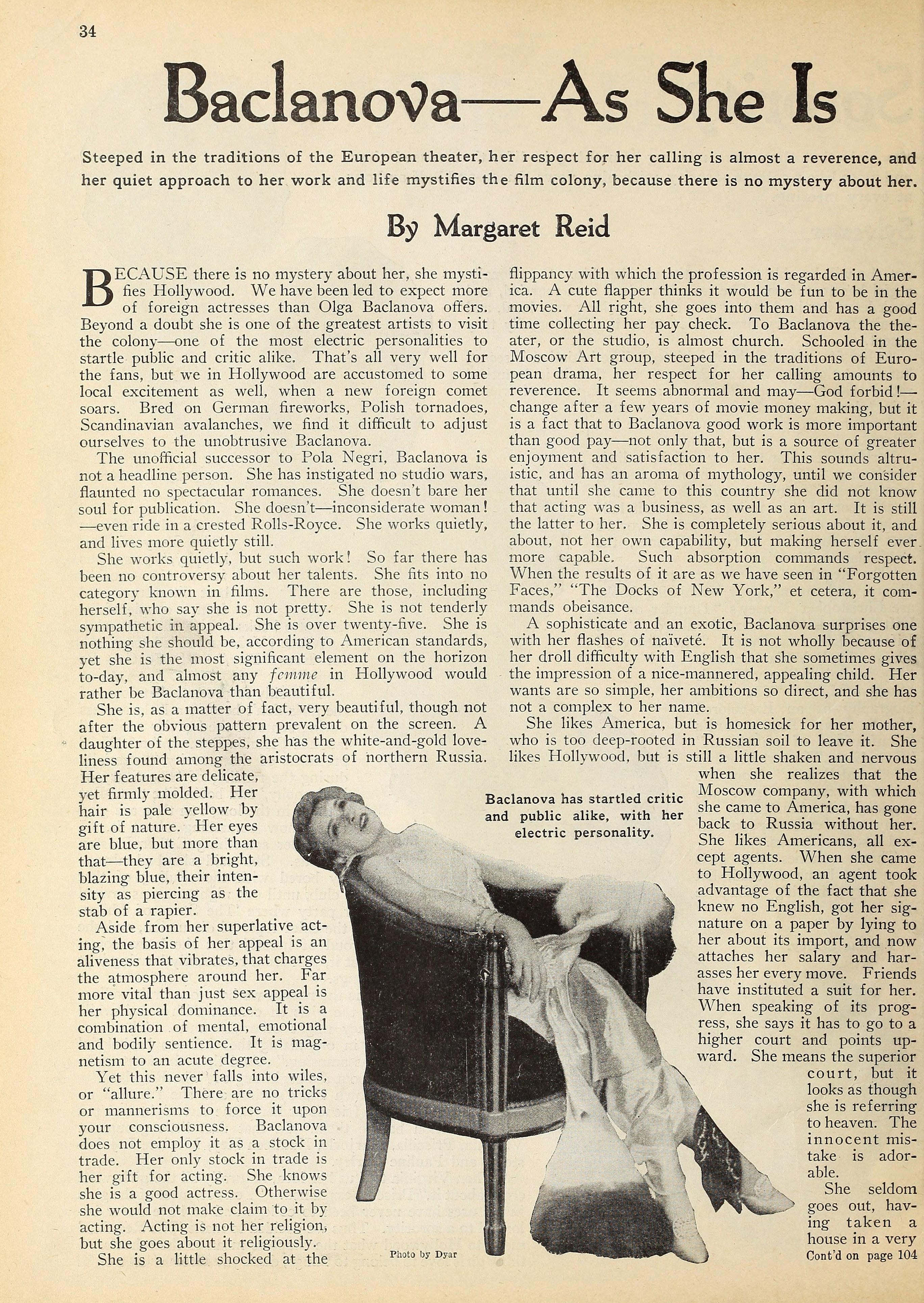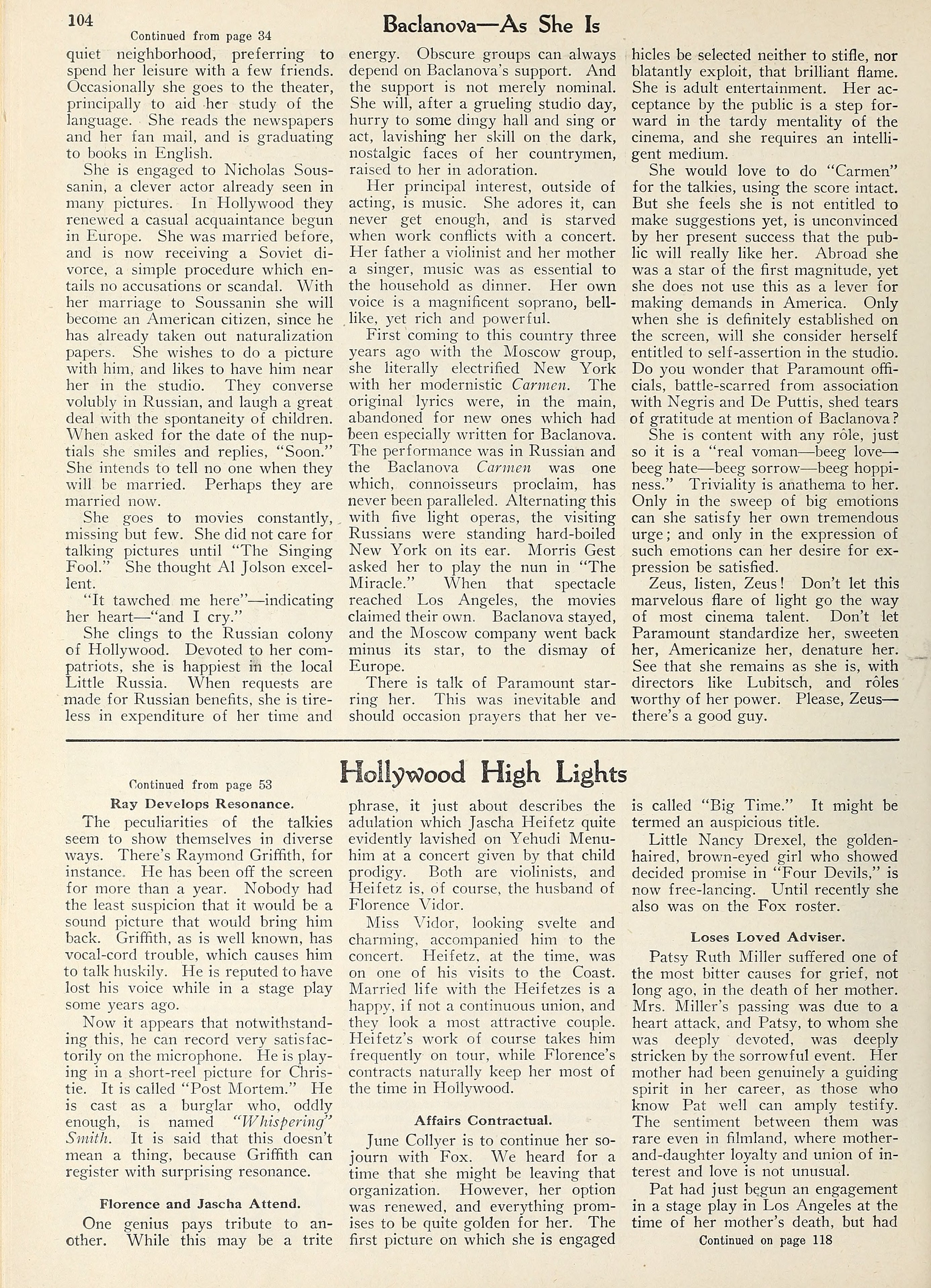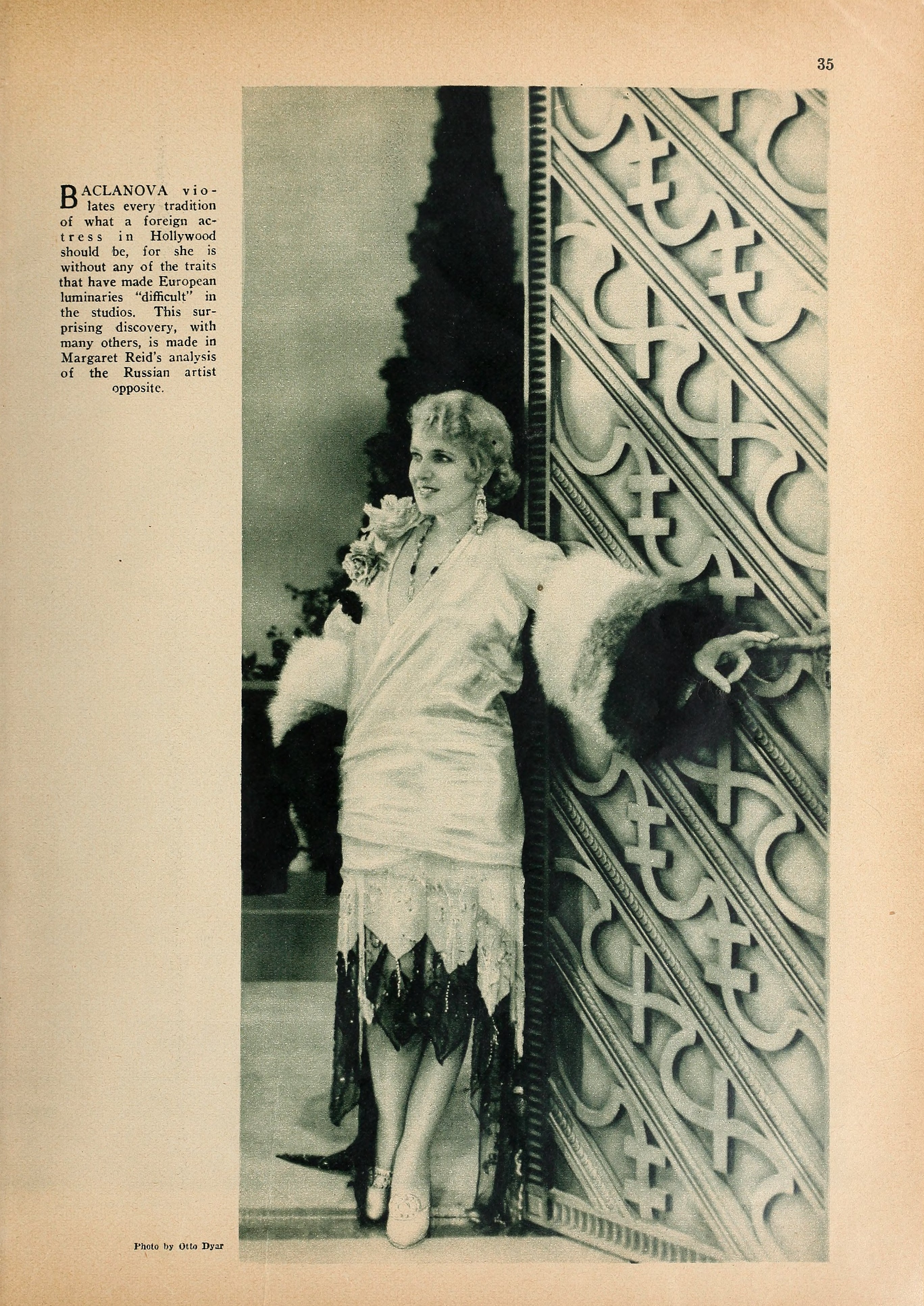Olga Baclanova — As She Is (1929) 🇺🇸

Because there is no mystery about her, she mystifies Hollywood. We have been led to expect more of foreign actresses than Olga Baclanova offers. Beyond a doubt she is one of the greatest artists to visit the colony — one of the most electric personalities to startle public and critic alike.
by Margaret Reid
That's all very well for the fans, but we in Hollywood are accustomed to some local excitement as well, when a new foreign comet soars. Bred on German fireworks, Polish tornadoes, Scandinavian avalanches, we find it difficult to adjust ourselves to the unobtrusive Baclanova.
The unofficial successor to Pola Negri, Baclanova is not a headline person. She has instigated no studio wars, flaunted no spectacular romances. She doesn't bare her soul for publication. She doesn't — inconsiderate woman! — even ride in a crested Rolls-Royce. She works quietly, and lives more quietly still.
She works quietly, but such work! So far there has been no controversy about her talents. She fits into no category known in films. There are those, including herself,' who say she is not pretty. She is not tenderly sympathetic in appeal. She is over twenty-five. She is nothing she should be, according to American standards, yet she is the most significant element on the horizon to-day, and almost any femme in Hollywood would rather be Baclanova than beautiful.
She is, as a matter of fact, very beautiful, though not after the obvious pattern prevalent on the screen. A daughter of the steppes, she has the white-and-gold loveliness found among the aristocrats of northern Russia. Her features are delicate, yet firmly molded. Her hair is pale yellow by gift of nature. Her eyes are blue, but more than that — they are a bright, blazing blue, their intensity as piercing as the stab of a rapier.
Aside from her superlative acting the basis of her appeal is an aliveness that vibrates, that charges the atmosphere around her. Far more vital than just sex appeal is her physical dominance. It is a combination of mental, emotional and bodily sentience. It is magnetism to an acute degree.
Yet this never falls into wiles, "allure." There are no tricks mannerisms to force it upon your consciousness. Baclanova does not employ it as a stock in trade. Her only stock in trade is her gift for acting. She knows she is a good actress. Otherwise she would not make claim to it by acting.
Acting is not her religion, but she goes about it religiously. She is a little shocked at the flippancy with which the profession is regarded in America. A cute flapper thinks it would be fun to be in the movies. All right, she goes into them and has a good time collecting her pay check.
To Baclanova, the theater, or the studio, is almost church. Schooled in the Moscow Art group, steeped in the traditions of European drama, her respect for her calling amounts to reverence. It seems abnormal and may — God forbid! — change after a few years of movie money making, but it is a fact that to Baclanova good work is more important than good pay — not only that, but is a source of greater enjoyment and satisfaction to her.
This sounds altruistic, and has an aroma of mythology, until we consider that until she came to this country she did not know that acting was a business, as well as an art. It is still the latter to her. She is completely serious about it, and about, not her own capability, but making herself evermore capable. Such absorption commands respect. When the results of it are as we have seen in Forgotten Faces, The Docks of New York, et cetera, it commands obeisance.
A sophisticate and an exotic, Baclanova surprises one with her flashes of naivete. It is not wholly because of her droll difficulty with English that she sometimes gives the impression of a nice-mannered, appealing child. Her wants are so simple, her ambitions so direct, and she has not a complex to her name.
She likes America, but is homesick for her mother, who is too deep-rooted in Russian soil to leave it. She likes Hollywood, but is still a little shaken and nervous when she realizes that the Moscow company, with which she came to America, has gone back to Russia without her.
She likes Americans, all except agents. When she came to Hollywood, an agent took advantage of the fact that she knew no English, got her signature on a paper by lying to her about its import, and now attaches her salary and harasses her every move. Friends have instituted a suit for her. When speaking of its progress, she says it has to go to a higher court and points upward. She means the superior court, but it looks as though she is referring to heaven. The innocent mistake is adorable.
She seldom goes out, having taken a house in a very quiet neighborhood, preferring to spend her leisure with a few friends. Occasionally she goes to the theater, principally to aid her study of the language. She reads the newspapers and her fan mail, and is graduating to books in English.
She is engaged to Nicholas Soussanin, a clever actor already seen in many pictures. In Hollywood they renewed a casual acquaintance begun in Europe. She was married before, and is now receiving a Soviet divorce, a simple procedure which entails no accusations or scandal. With her marriage to Soussanin she will become an American citizen, since he has already taken out naturalization papers. She wishes to do a picture with him, and likes to have him near her in the studio. They converse volubly in Russian, and laugh a great deal with the spontaneity of children. When asked for the date of the nuptials she smiles and replies, "Soon." She intends to tell no one when they will be married. Perhaps they are married now.
She goes to movies constantly, missing but few. She did not care for talking pictures until The Singing Fool. She thought Al Jolson excellent.
"It tawched me here" — indicating her heart — "and I cry."
She clings to the Russian colony of Hollywood. Devoted to her compatriots, she is happiest in the local Little Russia. When requests are made for Russian benefits, she is tireless in expenditure of her time and energy. Obscure groups can always depend on Baclanova's support. And the support is not merely nominal. She will, after a grueling studio day, hurry to some dingy hall and sing or act, lavishing her skill on the dark, nostalgic faces of her countrymen, raised to her in adoration.
Her principal interest, outside of acting, is music. She adores it, can never get enough, and is starved when work conflicts with a concert. Her father a violinist and her mother a singer, music was as essential to the household as dinner. Her own voice is a magnificent soprano, bell-like, yet rich and powerful.
First coming to this country three years ago with the Moscow group, she literally electrified New York with her modernistic Carmen. The original lyrics were, in the main, abandoned for new ones which had been especially written for Baclanova. The performance was in Russian and the Baclanova Carmen was one which, connoisseurs proclaim, has never been paralleled. Alternating this with five light operas, the visiting Russians were standing hard-boiled New York on its ear. Morris Gest asked her to play the nun in The Miracle. When that spectacle reached Los Angeles, the movies claimed their own. Baclanova stayed, and the Moscow company went back minus its star, to the dismay of Europe.
There is talk of Paramount starring her. This was inevitable and should occasion prayers that her vehicles be selected neither to stifle, nor blatantly exploit, that brilliant flame. She is adult entertainment. Her acceptance by the public is a step forward in the tardy mentality of the cinema, and she requires an intelligent medium.
She would love to do Carmen for the talkies, using the score intact. But she feels she is not entitled to make suggestions yet, is unconvinced by her present success that the public will really like her. Abroad she was a star of the first magnitude, yet she does not use this as a lever for making demands in America. Only when she is definitely established on the screen, will she consider herself entitled to self-assertion in the studio. Do you wonder that Paramount officials, battle-scarred from association with Negris and De Puttis [Lya de Putti], shed tears of gratitude at mention of Baclanova?
She is content with any role, just so it is a "real voman — beeg love — beeg hate — beeg sorrow — beeg hoppiness." Triviality is anathema to her. Only in the sweep of big emotions can she satisfy her own tremendous urge; and only in the expression of such emotions can her desire for expression be satisfied.
Zeus, listen, Zeus! Don't let this marvelous flare of light go the way of most cinema talent. Don't let Paramount standardize her, sweeten her, Americanize her, denature her. See that she remains as she is, with directors like Lubitsch [Ernst Lubitsch], and roles worthy of her power. Please, Zeus — there's a good guy.

Photo by: Otto Dyar


Baclanova violates every tradition of what a foreign actress in Hollywood should be, for she is without any of the traits that have made European luminaries "difficult" in the studios. This surprising discovery, with many others, is made in Margaret Reid's analysis of the Russian artist opposite.
Photo by: Otto Dyar
Collection: Picture Play Magazine, March 1929
